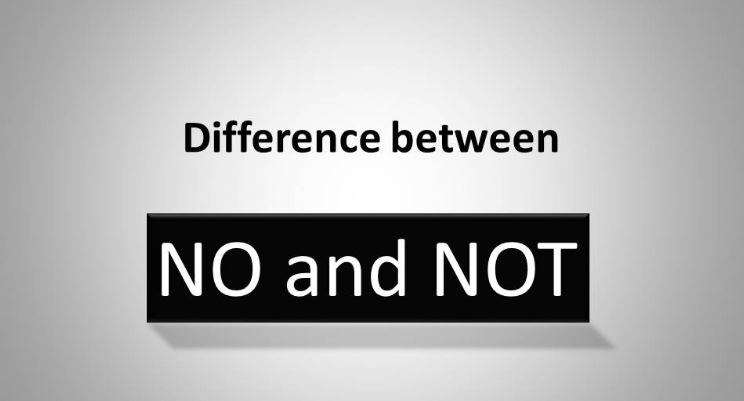What is the difference between ‘no’ and ‘not’?
“No” and “Not” both are for making the sense negative. But there are some differences between these two negative word in using in a sentence. Often we fall in problem when we come to use these- “no and not” in a sentence. Today we are going to discuss about this “no and not”. I have discussed here the 4 major reasons for using “no” and the 4 major reasons for using “not”
Here is the below a comparative study between no and not.
4 causes to use ‘no’ with example:
1. Yes /No of a question or for the response of a question:
(a) Question: Do you want to more cake?
If the answer of this question is negative, so the answer will be like the below
Answer of this question – No
Or No, I don’t want to get more cake.
(b) Question: Are you going to market?
If the answer of this question is negative, so the answer will be like the below
Answer of this question – No
Or No, I am not going to market now.
(c) Question: Have you completed your task?
If the answer of this question is negative, so the answer will be like the below
Answer of this question – No
Or No, I have not completed the task yet.
(d) Question: Did you visit London a month ago?
If the answer of this question is negative, so the answer will be like the below
Answer of this question – No
Or No, I didn’t visit London a month ago.
(d) Question: Would you like some tea?
If the answer of this question is negative, so the answer will be like the below
Answer of this question – No, thanks
Or No, I didn’t visit London a month ago.
2. “No” before a noun without an article:
(a) She had no reason for being late.
(b) The company has no rivals or competitors.
(c) We have no money to buy this.
(d) They are not young as much as you think.
(e) I have no pen.
3. No can be used before a noun without an article (Except any/many/much/enough)
(a) Mr. X has no worthy opportunities.
(b) There is no market in the area.
(c) No cookies before dinner.
(d) There are no eggs in the fridge.
4. Here are some common phrases or traits:
No problem, no good, no need, no idea, no chance,
He has got no chance of persuading her
As “No” is a determiner, we should not usually use with other determiners, like the below:
| SL | Topics | Determiners |
| 1 | Articles | A, an, the |
| 2 | Possessive pronouns | My, your, his, her, its, our, their, |
| 3 | Demonstrative | This, that, these, those |
| 4 | Quantifiers | Few, fewer, little, many, much, most, some, any |
| 5 | Numbers | One, two, three, ninety eight |
| 6 | Other | Each, every, all, enough |
Note: But you can use no with other, more, less, such
4 causes to use ‘not’ with example:
1. “No” is used making a verb negative.
(a) I don’t (do not) like biscuit.
(b) He doesn’t (does not) go to office regularly.
(c) She has not gone there.
(d) They are not making mistakes now.
2. Precedes a noun that has an article.
(a) This is not the building.
(b) The virus is not the causes of disease.
(c) He is not a student.
(d) They are not the robbers.
3. Before of any/ many, much/enough.
(a) She does not have enough time to come to my house.
(b) I have not many friends in Dhaka.
(c) She has not much money at his hand now.
(d) There are not any eggs.
4. Before of possessive adjective.
(a) These are not my dress.
(b) He is not my brother.
(c) She is not their cousin.
(d) Hassan ws not our relative.
5. Here are some common phrases or traits:
Why not?
Why are you not going to the doctor?
OK that’s end. Now your turn to practise and share my post if you like and understand better.
In each box, write either No or Not.
a) He said he has ——— time to help me so it looks as if I’m on my own!
b) You have ——- only endangered your own safety but also that of the spectators.
c) —————- wonder he was late. Look at all the books he’s carrying!
d) Will you ——— try and talk to the boss and see if he can’t find another way of increasing profits?
e) The company had ——– serious rivals in the industry.
f) The virus is ————— the source of the outbreak. We must keep looking.
g) There is ———- much money left for another experiment.
h) ———–longer happy with organizing parties every weekend, Phil decided to form a rock band.
i) I can see you tomorrow, but ——— on Friday.
j) I have ———– idea what time she’ll be arriving.
k) I do ———– have any idea what time she’ll be arriving.

